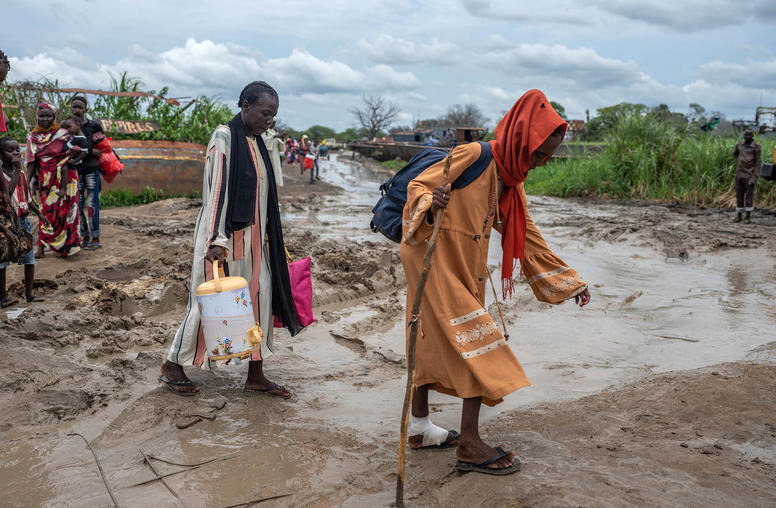The Politics of Oil and a Proposed Pipeline for South Sudan
USIP's Jon Temin and Raymond Gilpin take questions on recent events in South Sudan, where a controversial plan to build an oil pipeline across Kenya was recently announced.
USIP’s Jon Temin, director of the Sudan program, and Raymond Gilpin, director for Sustainable Economies, take questions about events now unfolding in South Sudan after Juba recently announced a controversial plan to build an oil pipeline through Kenya.
South Sudan announced a deal under which it would export its crude oil through Kenya, excluding its northern neighbor, Sudan. At the same time, the Sudanese government is angry over what it describes as unpaid “transit fees.” What’s going on here?
Jon: This is the latest development in a long saga concerning the terms of South Sudan’s secession from Sudan in July 2011. For more than two years leaders from both countries have been engaged in intermittent negotiations on oil and other “post referendum issues,” with the African Union playing a facilitation role. Little real progress has been made. Recently, Sudan started unilaterally seizing portions of South Sudan’s oil that transits through Sudan, arguing that the oil was taken in lieu of transit fees Sudan said were unpaid (which South Sudan denies). In response, South Sudan threatened to shut down all oil production, and in the past few days they seem to be making good on that promise by initiating the process of closing oil wells across the country. South Sudan is eager to build an alternative pipeline – likely through Kenya – so that they do not have to send their oil through Sudan and negotiate transit fees with their long-time adversaries. But there are many obstacles to making this proposed pipeline a reality. If the oil shutdown is completed, both Sudan and South Sudan will suffer immensely given their dependence on oil revenue.
Does this issue pose a serious danger to the already fragile relations between Sudan and South Sudan?
Jon: Yes. If Sudan and South Sudan are unable to reach agreement on transit fees and revenue-sharing, then they are unlikely to reach agreement on other important but unresolved issues. These include demarcating the border between the two countries, the future of the contested Abyei area and determining the legal status of the hundreds of thousands of South Sudanese who live in Sudan. Given the history of violence in the region, for both countries to be peaceful, they will need to maintain communication and some modicum of civility. But if the shutdown is completed and there is further discussion of a pipeline through Kenya, it will likely inflame the relationship and inhibit dialogue. Some of the most destructive periods of Sudan’s civil wars occurred when the north and south were not engaging one another diplomatically. Though Sudan and South Sudan are not currently at war, they are barely talking to each other. As a result, the opportunity for rash actions increases, as does the likelihood of unnecessary violence.
Analysts believe the plan to build a pipeline through some of Kenya’s most dangerous terrain, including many hotly contested tribal areas, is improbable. Is the skepticism of analysts warranted?
Raymond: A petroleum pipeline from South Sudan to a port in the northern Kenyan coast – most probably Lamu – will traverse difficult terrain in terms of topography and security. The proposed pipeline would go through Kenya in a south-, south-easterly direction, avoiding the troubled northeastern region that is historically home to the Somali and Sakuye groups. Those groups have agitated for self-determination for decades, and that is currently the epicenter of [terrorist group] al Shabaab activity. This does not mean that the construction of a pipeline will be fraught with tremendous risk. If the pipeline is deemed profitable, would-be investors would be willing to mitigate the risks and take steps to protect their investment. These could include having most of the pipeline underground, or reaching agreements with local groups via strategic corporate social investments. Forging some consensus with ethnic groups will be relatively easier because the route will avoid the more troubled northeast.
Reports show that the amount of oil South Sudan would export will dwindle over time. Is there enough oil in South Sudan to justify what one estimate put as $1.5 billion for this new pipeline?
Raymond: It is true that South Sudan’s production levels have been dwindling in recent months, but we must not forget that this is based on known reserves and existing technology. Production forecast would increase if new finds are discovered and production methods are improved. This will make the investment in a pipeline much more attractive. The pipeline would cost a lot because of its length and the predominant type of crude exported by South Sudan (the heavy paraffinic Dar blend, which requires a number of heating/pumping stations along the pipeline). Some investors from China, South Korea and Japan are reported to have expressed an interest in this investment. Quite apart from the possibility of new finds in South Sudan, investors are also attracted by a couple of other factors. The first is the possibility of linking the pipeline to a Central African grid that could facilitate the export of crude from new finds in countries like Uganda and Tanzania. This would enhance profitability. A second possible attraction could be the possible creation of a “land bridge” that would provide exporters in the Arabian peninsula with an option to avoid insecurity and piracy in and around Somali waters by using facilities at Port Said in Egypt to get crude to tankers at Lamu. Although these regional possibilities, coupled with the possibility of new finds in South Sudan, continue to tantalize possible investors, the success of such a venture would depend on unprecedented regional cooperation, deep-pocketed investors and stability in South Sudan.
Explore Further
- Conflict Analysis: The Two Sudans
USIP Academy Course



